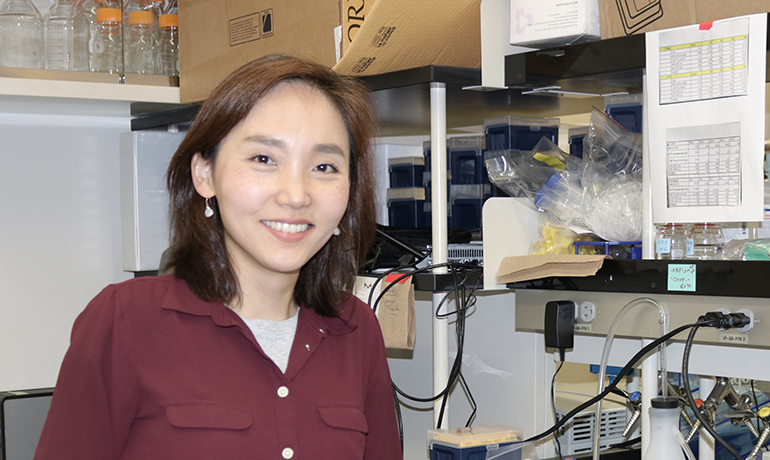
Researchers at the University of Illinois Chicago, led by University of Illinois Cancer Center member Jiyeon Kim, and Children’s Medical Center Research Institute at University of Texas Southwestern, have uncovered a potential treatment for a highly aggressive form of non-small cell lung cancer (NSCLC).
The discovery, said Kim, PhD, assistant professor of biochemistry and molecular genetics at the University of Illinois College of Medicine and a member of the University of Illinois Cancer Center’s Cancer Biology program, could lead to new treatments for patients with mutations in two key genes – KRAS and LKB1. KRAS is the most common oncogenic alteration in various cancers that has emerged as an important predictive biomarker in common malignancies as NSCLC, while LKB1 is a tumor suppressor that provides instructions for making the enzyme serine/threonine kinase 11.
Patients whose tumors contain both KRAS and LKB1, known as KL (Klotho) tumors, have poor outcomes and often respond poorly to immunotherapy.
Scientists know that mutations in either KRAS or LKB1 can alter metabolism individually, but less is known about the metabolic needs when both genes are mutated in the same tumor, Kim said. In new research published in Nature Metabolism, scientists compared metabolic properties of KL tumors genetically modified in mice to tumors containing different mutations and to the normal lung. It was discovered that the hexosamine biosynthesis pathway (HBP) – which plays critical roles in nutrient sensing, stress response, and cell growth – is activated in KL tumors.
Kim, the co-corresponding author on the paper whose research is focused on fundamental molecular mechanisms underlying cancer metabolism, metabolic pathways and apoptosis, assisted with the research while performing a postdoctoral fellowship at the Howard Hughes Medical Institute/University of Texas-Southwestern Medical Center in Dallas under the direction of Ralph DeBerardinis, MD, PhD, professor and chief, Division of Pediatric Genetics and Metabolism. The recent findings were consistent with prior research conducted in the DeBerardinis lab that showed KL cells reprogram carbon and nitrogen metabolism in ways that promote their growth but increase their sensitivity to particular metabolic inhibitors.
“The HBP allows cells to modify proteins through a process called glycosylation, which facilitates protein trafficking and secretion,” Kim said. “The high rate of protein creation that fuels KL tumor growth is thought to require activation of the HBP.” Researchers developed a method to inhibit the HBP by identifying the enzyme GFPT2 as a key liability in KL tumors.
“Genetically silencing or chemically inhibiting this enzyme suppressed KL tumor growth in mice, but had little effect on the growth of tumors containing only the KRAS mutation. The entire results indicate the selective importance of the HBP in KL tumors and suggest that GFPT2 could be a target for this aggressive subtype of NSCLC,” Kim said.
DeBerardinis said in the past researchers believed most tumors relied on the same small number of metabolic pathways to grow. Over the last decade, however, “we’ve learned this is an oversimplification. Instead, different tumor subclasses have particular metabolic needs arising from mutations in key genes. Understanding how specific combinations of mutations promote tumor growth and metastasis may allow us to design tailored therapies for patients.
UIC researchers assisting Kim and DeBerardinis were Hyun Min Lee, Elizabeth Lieu, Nefertiti Muhammad, Shawn Rhyne and Mohamed Haloul. The work was funded by the NCI (grant no. 1K22CA226676-01A1), American Lung Association (grant no. LCD-614827) and V Foundation (grant no.V2019-022).
